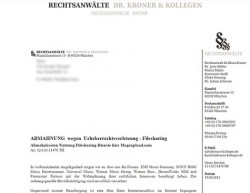Weekly News Roundup (25 March 2012)
Welcome to another edition of the WNR. Two weeks ago, I mentioned I was working on a project for Digital Digest that should be ready in about two weeks time. Unfortunately, the same is still true today, as I’m still working on it, and it’s still (at least) two week away from being ready.
And the delay is totally unrelated to Skyrim, or the fact that I unceremoniously passed 100 hours of play time this week. Most of what I’ve been doing in the game this week has been very “chore-ish”, having spent most of yesterday’s playtime moving from my house in Whiterun to Riften – meaning multiple trips carrying the assortment of goodies and junk that I’ve been hoarding at my old house, fast travelling the many miles between the two hamlets, all the while not wearing any clothes as to clear up as much carrying weight as possible. Trust me, it’s not as fun as it sounds.
A couple of interesting stories to go through this week, so let’s get started.

Google has dragged itself into the Megaupload affair by coming to the defence of Hotfile, or rather, the defence of the DMCA’s “safe harbor” provision.
The MPAA is currently suing Hotfile, and one of the argument that the industry trade body has made is that Hotfile should not be afforded the protection of “safe harbor”, due to the “rampant” nature of piracy that goes on on the file sharing website. Another argument is that Hotfile has not been cooperating with the MPAA fully in terms of providing the technical anti-piracy measures that the MPAA studios want. Google says both of these arguments are invalid because current case law does not strip away “safe harbor” based on “generalized awareness that unspecified (or even ‘rampant’) infringement is occurring”, and that there’s nothing in the law that says Hotfile must implement the type of content filtering that the rights holder requests, as the decision is mostly left up to the service provider.
Both of these arguments have been made against Megaupload too in the government’s criminal case against the file hosting website. And another key argument in the government’s case, which was also employed by the MPAA in the case against Hotfile, is that the website operators only removed content that had been specifically listed by the rights holder, and deliberately kept similar or even the exact same content on their network. Google argues that this is perfectly in-line with the spirit of the DMCA, with the burden of identifying infringing content belonging to rights holders (the only people that can decide which content should be removed and which should be kept). The argument works a little better for Google’s assets, such as YouTube, than for Hotfile/Megaupload though – it’s often in the rights holder’s interest to keep some “infringing” content active on YouTube due to promotional reasons, while at the same time removing others (even if it’s the same video, re-uploaded). With Hotfile/Megaupload, it’s unlikely that, for example, Warner Bros. would want to keep a copy of The Dark Knight available for download, but in Google’s view, Hotfile did exactly what the DMCA demanded it to do, nothing less, but certainly nothing more than what’s required, such as removing content that was not specifically listed.
Rapidshare, in a German court, is also facing similar accusations, and as a result, it could be forced to implement drastic site-wide filtering for all uploads.
The issue of how proactive a service provider should be is at the heart of the DMCA “safe harbor” argument, with content holders now accusing Internet companies of “abusing” the protection afforded to them by the provision, by deliberately turning a blind eye to ongoing infringement just because it has not be specifically named. But the alternative is for service providers to “second guess” the intentions, and the legal rights, of content holders, to take a “better safe than sorry” approach, the collateral damage from such actions which will mean a lot of harm to innovation and creativity (and is ever more the problem on YouTube, with its automated “Content ID” system and false positives). I don’t know what the answer is, but draconian blanket bans and filtering can’t be the best solution out there, not when there’s still so much that content holders can do to make the legal option the more enticing one. The DMCA, conceived by the likes of the MPAA, is already far too biased towards rights holders at the expense of innovation and creativity – but it seems it’s still not biased enough, hence the “need” for PIPA/SOPA/ACTA.

A letter is floating around in Europe "suing" users for uploading and downloading stuff to/from Megaupload
And the not so subtle bias in current copyright laws has also produced a climate of fear and uncertainty, with most people unaware of their actual rights when it comes to these kind of disputes. This has led to mass copyright lawsuits that use the fear, and sometimes the embarrassment, to “encourage” users to pay a pre-trial settlement fee to make the matter go away. It’s no wonder it’s been referred to as “legal blackmail”. But if you take this just one step further, something that many consider ethically suspect turns into an outright scam, and report this week suggest that Megaupload users are now being targeted. A fake mass copyright style letter is being sent to potential Megaupload users demanding a settlement fee, or the threat of a 10,000 euros lawsuit. The small matter of the law firm responsible for these letters not actually existing should be the first clue as to the validity of these claims, and also the fact that payments being made is going to a Slovakian bank account, for a law firm that’s supposed to be based in Munich.
Unfortunately, the MPAA’s actions may have only added to the believability of these scams , when they requested the web host of Megaupload to retain data, including user data, for future potential lawsuits. But even the MPAA knows the public’s distaste for this kind of thing, so they did make it clear that individual user lawsuits are not on the cards. A civil case against Megaupload and its “intermediaries”, on the other hand, now seems more than likely.
Moving on, Ubisoft this week hinted that the company might be suffering from a split-personality disorder when the company’s VP of Digital Publishing, Chris Early, spoke about intrusive DRM and how it’s doing paying customers a disservice. Not only that, Early says that Ubisoft really really wants to make DRM “go away” (I’ve got an idea where Ubisoft can put their DRM), and they think the best way to do it is through adding value to the legitimate gaming experience (they can start by not making the legitimate gaming experience a pain in the butt, thanks to their DRM). But what Early may be hinting at is the business model of MMO’s and how Ubisoft can learn from it, by incorporating some of the elements that keep people coming back (and paying) into the single player experience. I’m not sure ham-fisting MMO elements and the subscription model into single player games, along with a MMO’s requirement of always being online (which, for a single player game, is nothing more than a DRM. UbiDRM to be exact), is the best idea to be honest. Making better games, lowering the price, and providing online features, ongoing support, and exclusive content, might all be better solutions.

Flags of truce came out this week in the HTML5 vs Flash vs H.264 vs WebM/Theora war, as Mozilla signaled their surrender. Sort of.
A little bit of background: The issue surrounds HTML5’s new ability to allow videos to embedded and played without the need to install third party plug-ins, like Flash. But just which video format HTML5 video would work with has been up for debate for a while now, with H.264 being the obvious choice (as it is the ones most used with Flash based videos today, and also an industry standard), but also the valid argument that the royalty and patent encumbered H.264 format isn’t ideal, especially since some of today’s most popular browsers are the open source variety. Mozilla, in particular, was strongly objected to H.264 support being made mandatory for HTML5 browsers. Google, sensing an opportunity, stepped up and produced the VP8 based WebM format. But the format failed to gain any traction, and so this week, Mozilla has had to do the unthinkable: start supporting H.264.
Mozilla made the announcement this week that they would have to now offer H.264 support, especially for their mobile based products, as they see no other way forward without supporting a format that’s even more entrenched in the mobile market than on desktop/standalones. While Mozilla would not be providing a built-in decoder, they would allow their Firefox browser to use existing software and hardware capabilities to decode H.264.
In my opinion, this was always going to be the likely outcome. Google’s half-hearted support for WebM, some say hypocritically considering their Android platform offers H.264 decoding as standard, was never going to be enough to out-muscle H.264, especially since none of the major hardware makers were even interested to offer WebM support. And with Apple firmly behind H.264, and everyone else trying to out-Apple Apple, WebM had little or no chance to succeed.
So what does this mean for the average user? It means that HTML5 video now has a greater chance to succeed and become a true replacement for Flash, and that’s probably a tick in the win column for everyone, even if this is a set-back for open-source video standards. MPEG LA, the licensing authority for H.264, for what it’s worth, has promised not to charge royalties for this type of H.264 usage for the foreseeable future, so H.264 is free for the time being without being “free”, if you know what I mean.
And finally, a story that feels a bit “PR-ish” to me, where Sony’s DVD disc art for their remake of “The Girls with the Dragon Tattoo” is confusing people into thinking they’ve been sold a pirated copy of the movie. The disc art resembles a home made Sony DVD-R with the title of the film printed on to make it look like it was written on with black markers, and it’s supposed to be a reference to the main character of the film, Lisbeth Salander, and her hacking ways. Those that purchased the Blu-ray+DVD combo version might be even more confused, since the Blu-ray disc art is fairly traditional, which makes the “DVD-R” stand out even more.
But a closer look reveals the MPAA rating, region info, and even some copyright text on the supposed home made “DVD-R”. And the “DVD-R” being a Sony branded one, of course alludes to the fact that they were the studio behind the movie. So would it really have fooled people into calling up Redbox or whoever to complain, as was claimed by some of the news articles? Maybe a surprise at first, sure, but to be completely fooled? I don’t think so. All has happened though is that this story has given the DVD set some free publicity, which is why I’m cynically leaning towards PR campaign on this one.
Alrighty then, that’s pretty much the week as I remember it. Must get back to my “move” in Skyrim, still got 90+ each of dragon bones and scales to move, as well as my assortment of 400 iron daggers. This could take a while … see you next week.


